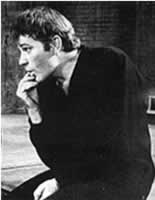![]()
Two Centuries of Thought
 |
Richard Burton - 1964
Two centuries later, Hamlet still muses; Hamlet still broods; and most critics still base their thinking on the vision of Hamlet created by the Romantics. He is a poet or philosopher by nature, and his reflections lead to internal conflict that inhibits actions. The following excerpt from the writing of Yale University professor, Harold Bloom, serves as a good representative of the preservation, and continuing development of this line of thought.
|
The largest mistake we can make about the play, Hamlet, is to think
that it is the tragedy of a man who could not make up his mind because
(presumably) he thinks too much.... The fundamental fact about Hamlet
is not that he thinks too much, but that he thinks too well. His is
simply the most intelligent role ever written for the Western stage;
indeed, he may be the most intelligent figure in all the world of
literature, West or East. Unable to rest in illusions of any kind,
he thinks his way through to the truth, which may be a pure nihilism,
yet a nihilism so purified that it possesses an absolute nobility,
even a kind of transcendentalism. |
Harold Bloom finds a foundation for this emendation of the Romantic view in Fredrich Neitzsche's The Birth of Tragedy.
Montaigne's experiential man avoids Dionysiac transports as well as
the sickening descents from such ecstasies. Nietzsche unforgettably
caught this aspect of Hamlet in his early The Birth of Tragedy,
where Coleridge's view of Hamlet (like Coleridge) thinks too much is
soundly repudiated in favor of the truth, which is that Hamlet thinks
too well. I quote this again because of its perpetual insight:
|
While appearing to refute the notion that Hamlet's excess thought prevents him from action, Harold Bloom argues that it is the quality of his thought that prevents action.